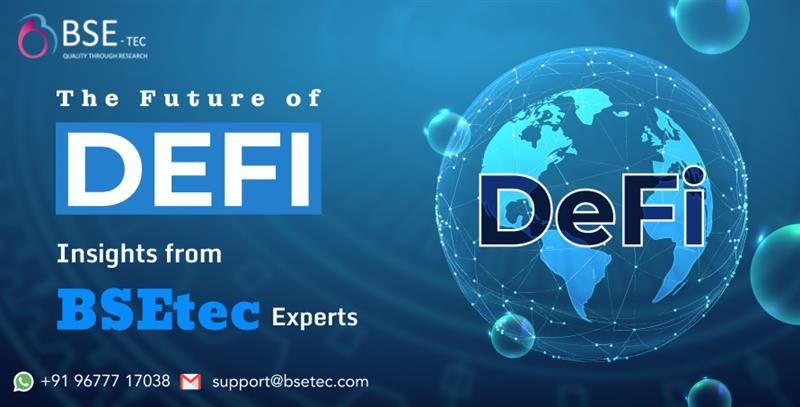
By cutting out middlemen and putting assets in the hands of individuals, DeFi is revolutionising the way we handle and access funds. Faster, more secure, and more user-friendly systems have transformed it from experimental to mainstream. Practical use, including as tokenised assets, cross-border payments, and decentralised financing, is demonstrating its viability.
Recent developments in scalable systems, smart contracts, and cross-chain interaction are propelling its widespread use. Decentralised solutions are the way of the future in the financial sector since they are open, honest, and efficient for everyone.
What is DeFi?
Blockchain technology is being used by Decentralised Finance (DeFi) to facilitate peer-to-peer financial services that do not rely on intermediaries, therefore disrupting conventional financial institutions. On DeFi platforms, users can use smart contracts on blockchain networks such as Polygon and Ethereum to do things like lend, borrow, trade, and even yield farm. These platforms seek to give customers more transparency, less dependence on centralised institutions, and more autonomy over their financial holdings.
Through smart contracts, DeFi allows you to lend or borrow cryptocurrencies directly without the need for banks. The system is quick, safe, and transparent because it manages interest and repayments automatically. This demonstrates how decentralisation and universal access to finance are possible.
Why is DeFi more popular in use?
Decentralised Finance is quickly changing the financial landscape. DeFi enables anyone with an internet connection to access financial services, including trading, lending, and borrowing, without the need for middlemen, in contrast to traditional banks. Because it gives consumers direct control, facilitates safe and transparent transactions, and consistently releases cutting-edge financial products, its popularity is rising. To put it briefly, DeFi is increasing the number of people using finance every day by making it more accessible, effective, and user-friendly.
- Inclusion and accessibility in finance
People from different backgrounds can use DeFi platforms to get financial services without needing traditional banks. This is especially helpful for people who live in areas that don’t have access to regular banking services. DeFi uses blockchain technology to let people trade with each other, which makes it easier for everyone to get involved in the economy.
- Getting rid of middlemen
Banks and brokers are common middlemen in traditional financial systems. These middlemen can cause delays and extra costs. DeFi gets rid of these middlemen by using smart contracts on blockchain networks, which let people trade directly with each other. This peer-to-peer method makes things work better and cuts down on the need to trust centralised groups.
- New and creative financial products
DeFi offers a wide range of investment options through new financial products like yield farming, liquidity mining, and synthetic assets. These products use blockchain technology to provide financial services that are easier to use and more flexible than traditional ones.
- Openess
Transactions on DeFi platforms are stored on public blockchains, which makes them clear and lets users check and audit transactions on their own. This openness builds trust among users and ensures that everyone is responsible in the financial system.
- Better safety
To protect user assets, DeFi platforms use cutting-edge cryptography and have their security checked on a regular basis. These platforms are decentralised, which lowers the risk of single points of failure and makes the financial system as a whole more secure.
How does it work?
Decentralized Finance (DeFi) is revolutionizing finance by eliminating traditional banking intermediaries. It enables users with internet access to utilize financial services directly through the use of smart contracts on the blockchain.
Smart contracts facilitate automatic lending, borrowing, and trading. Users can earn rewards by participating in liquidity pools, providing funds for loans, or trading. DeFi allows the tokenization of real-world assets and cryptocurrencies for use as collateral, enhancing financial flexibility.
All transactions are recorded transparently and securely on the blockchain, enabling users to verify activities without the need for banks. This system empowers individuals to lend crypto, earn interest, or borrow instantly, granting users full control over their finances.
Where is it used?
Decentralized Finance, commonly referred to as DeFi, is progressively integrating into daily financial operations, providing opportunities for individuals to exert greater control, gain more transparency, and achieve heightened efficiency when handling, investing, or trading digital assets. It empowers users with alternative solutions that surpass the capabilities of conventional financial systems.
In the realm of decentralized finance (DeFi), individuals have the opportunity to engage in direct lending and borrowing of cryptocurrencies through smart contracts, circumventing traditional banking systems.
Decentralized exchanges (DEXs) offer a platform for trading cryptocurrencies on a peer-to-peer basis, ensuring transactions are quick, secure, and transparent.
Furthermore, users can earn rewards by staking their digital assets or by contributing liquidity to various decentralized platforms. The intersection of DeFi with non-fungible tokens (NFTs) and tokenized real-world assets allows for the utilization of these digital collectibles as loans, collateral, or investments. Additionally, cross-chain platforms facilitate the seamless transfer of assets between different blockchain networks, thereby broadening the scope for participation and trading in the digital finance ecosystem.
Which industry is using the most DeFi applications?
The financial services sector is leading the charge in adopting decentralized finance (DeFi) due to its ability to tackle some of the enduring issues faced by traditional financial systems. Institutions such as banks, lenders, and investment platforms are increasingly investigating decentralized protocols to make operations like lending, borrowing, trading, and asset management more efficient, cost-effective, and transparent.
By utilizing smart contracts, transactions are automated, allowing users to bypass intermediaries and directly access cross-border financial services, free from the delays and limitations typical of conventional methods.
Moreover, DeFi enhances financial inclusivity; individuals who were previously unable to access standard banking services due to geographical constraints, credit histories, or high fees can now engage with global financial markets.
Recent advancements, such as cross-chain interoperability, tokenization of real-world assets, and programmable finance, are driving significant progress in the DeFi sector.
How the Finance industry adopts Defi and how BSEtec contributes to the DeFi sector, along with their experts
The finance industry is leading the way in embracing Decentralized Finance (DeFi) applications, utilizing blockchain technology to improve transparency, lower expenses, and broaden access to financial services. DeFi platforms facilitate activities such as peer-to-peer lending, borrowing, trading, and yield generation without relying on traditional intermediaries, thereby providing enhanced efficiency and inclusivity.
BSEtec plays a crucial role in the DeFi sector by creating customized solutions that cater to the changing demands of the financial industry, showcasing its proficiency across diverse DeFi applications.
BSEtec develops platforms that enable users to lend, borrow, and earn interest on digital assets without relying on traditional financial intermediaries. These platforms utilize smart contracts to automate and secure transactions, ensuring transparency and efficiency.
Decentralized exchange (DEX) platforms are designed to be secure, scalable, and user-friendly, enabling p2p trading of digital assets. Unlike traditional exchanges, these platforms function independently of central authorities, offering users enhanced control over their financial resources and trading activities.
BSEtec creates innovative solutions enabling users to generate income by supplying liquidity to decentralized finance (DeFi) protocols. This process involves activities such as yield farming and liquidity mining, where individuals engage in DeFi ecosystems. By doing so, they have the opportunity to earn rewards, which may come in the form of native tokens or transaction fees.
BSEtec provides bespoke development services for smart contracts, specifically designed to address unique decentralized finance (DeFi) applications like swaps, staking, and asset management. Alongside their development expertise, they carry out thorough security audits to safeguard smart contracts against potential vulnerabilities and exploits, ensuring their integrity and reliability.
When it comes to decentralized finance, we’re really paving the way over at BSEtec. We create blockchain solutions that businesses can truly benefit from, like decentralized exchanges, lending platforms, staking systems, and yield farming apps.
Our goal is to make these tools not only secure and scalable but also easy to blend in with existing financial systems. By working closely with our clients and understanding their specific needs, we craft tailor-made solutions that tackle real financial challenges. It’s all about making the finance world embrace decentralized systems smoothly, efficiently, and safely so that DeFi becomes practical and accessible for everyone.
BSEtec is all about creating a future where decentralized finance brings more openness, inclusivity, and efficiency to the financial world. They’re using cool technology like cross-chain platforms, smart contracts, and AI-driven protocols to build solid and scalable services. This way, both folks and companies can really benefit from these innovations, allowing decentralized financial services to grow and thrive. It’s exciting to think about how this could change finance for the better!


